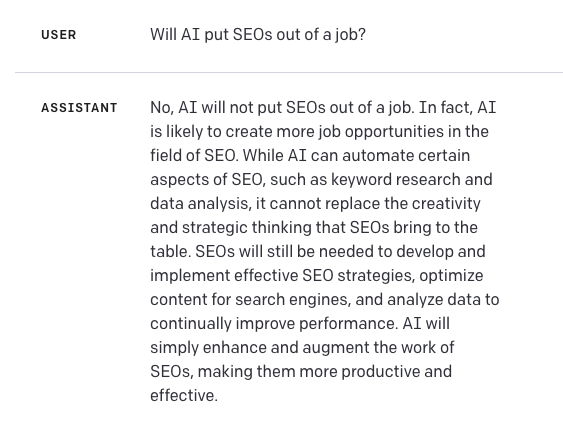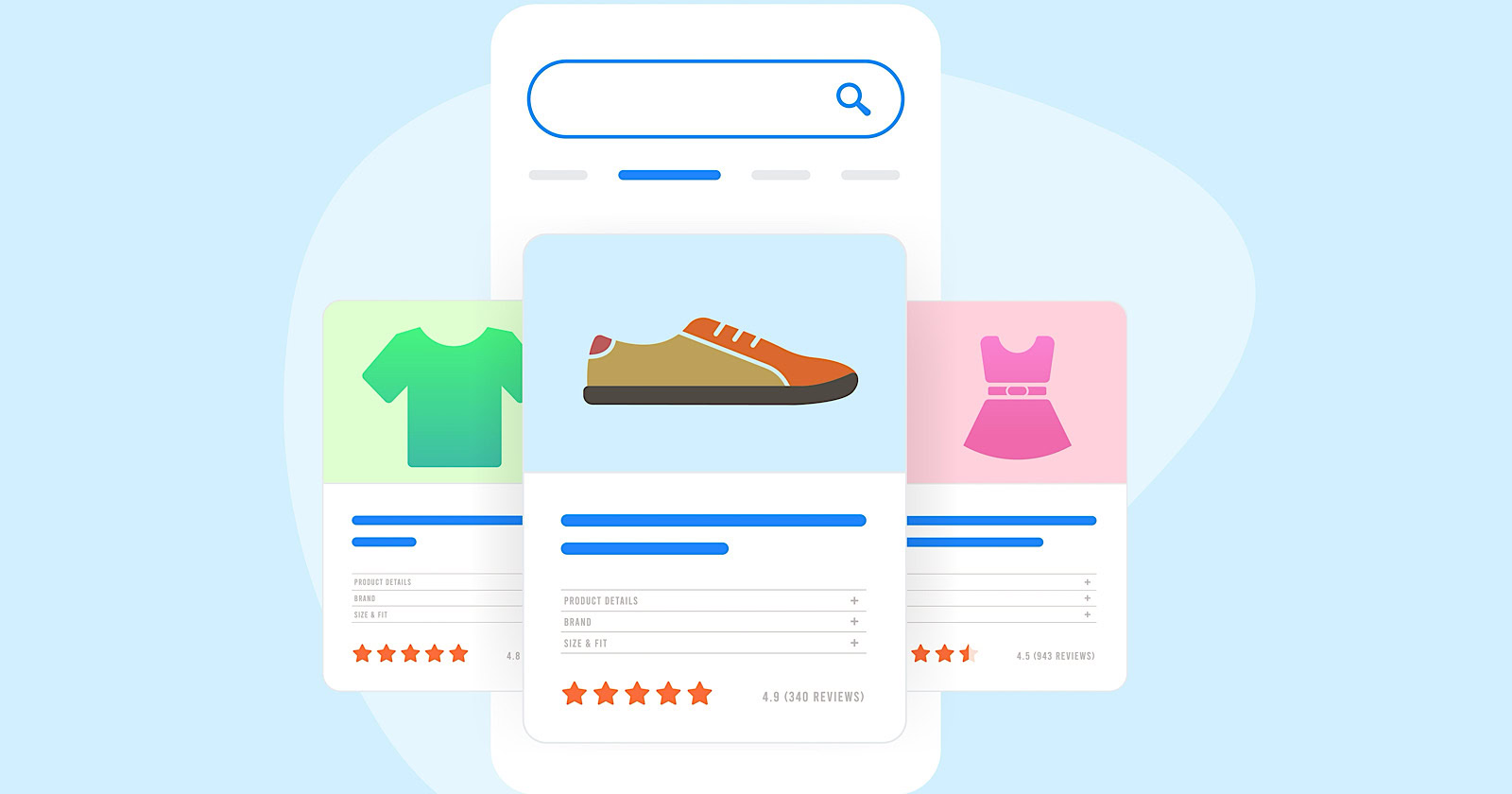SEO
Will AI Kill SEO? We Asked ChatGPT

It happens every couple of years.
First, it was Jason Calacanis and Mahalo, then the early social platforms.
We saw it again with voice search and smart assistants. For a minute, it was TikTok’s turn. Then the metaverse jumped the line.
Now, it’s ChatGPT and AI.
I’m talking, of course, about “SEO killers.”
Every now and then, a new technology comes along, and three things inevitably happen:
- Thousands of SEO professionals publish posts and case studies declaring themselves experts in the new thing.
- Every publication dusts off its “SEO is dead” article, changes the date, and does a find and replace for the new technology.
- SEO continues to be stronger than ever.
Rinse, repeat.
It would seem that search has more lives than a cartoon cat, but the simple truth is: Search is immortal.
How we search, what devices we use, and whether the answer is a link to a website will forever be up for debate.
But as long as users have tasks to complete, they’ll turn somewhere for help, and digital marketers will influence the process.
Will AI Replace Search?
There’s a ton of hype right now about AI replacing both search engines and search professionals – I don’t see that happening. I view ChatGPT as just another tool.
Much like a knife: You can butter bread or cut yourself. It’s all in how you use it.
Will AI replace search engines? Let’s ask it ourselves!
That’s a pretty good answer.
Many SEO professionals (including me) have been saying for years that the days of tricking the algorithm are long gone.
SEO has been slowly morphing into digital marketing for a long time now. It’s no longer possible to do SEO without considering user intent, personas, use cases, competitive research, market conditions, etc.
Ok, but won’t AI just do that for us? Is AI going to take my job? Here’s a crazy idea: Let’s ask ChatGPT!
 Screenshot from ChatGPT, March 2023
Screenshot from ChatGPT, March 2023AI Isn’t Going To Take Your Job. But An SEO Who Knows How To Use AI To Be More Efficient Just Might
Why? Let’s dive in.
I still see a lot of SEO pros writing articles that ask AI to do things it’s simply incapable of – and this comes from a basic understanding of how large language models actually work.
AI tools, like ChatGPT, aren’t pulling any information from a database of facts. They don’t have an index or a knowledge graph.
They don’t “store” information the way a search engine does. They’re simply predicting what words or sentences will come next based on the material they’ve been trained on. They don’t store this training material, though.
They’re using word vectors to determine what words are most likely to come next. That’s why they can be so good and also hallucinate.
AI can’t crawl the internet. It has no knowledge of current events and can’t cite sources because it doesn’t know or retain that information. Sure, you can ask it to cite sources, but it’s really just making stuff up.
For really popular topics that were discussed a lot, it can get pretty close – because the probabilities of those words coming next are really high – but the more specific you get, the more it will hallucinate.
Given the extreme amount of time and resources it takes to train the model, it will be a long time before AI can answer any queries about current events.
But What About Bing, You.com, And Google’s Upcoming Bard? They Can Do All Of This, Can’t They?
Yes and no. They can cite sources, but that’s based on how they’re implementing it. To vastly oversimplify, Bing isn’t asking for a pure chatbot.
Bing is searching for your query/keyword. It’s then feeding in all the webpages that it would normally return for that search and asking the AI to summarize those webpages.
You and I can’t do that on the public-facing AI tools without hitting token limits, but search engines can!
Ok, Surely This Will Kill SEO. AI Will Just Answer Every Question, Right?
I disagree.
All the way back in 2009 (when we were listening to the Black Eyed Peas on our iPhone 3Gs and updating our MySpace top 8 on Windows Vista), a search engine once called Live was being renamed to Bing.
Why? Because Bing is a verb. This prompted Bill Gates to declare, “The future of search is verbs.”
I love to share this quote with clients every chance I get because that future is now.
Gates wasn’t talking about people typing action words into search engines. He meant that people are trying to “do” something, and the job of search is to help facilitate that.
People often forget that search is a form of pull marketing, where users tell us what they want – not push marketing like a billboard or a TV ad.
As digital marketers, our job is simple: Give users what they want.
This is where the confusion comes in, though.
For many queries that have simple answers, a link to a website with a popup cookie policy, notification alert, newsletter sign-up popup, and ads were never what the user wanted.
It’s just the best thing we had back then. Search engines never set out with the end goal of providing links to websites. They set out to answer questions and help users accomplish tasks.
Even from the earliest days, Google talked about how its goal was to be the Star Trek computer; it just didn’t have the technology to do it then. Now, it does.
For many of these queries, like [how old is Taylor Swift?] or [how many megabytes in a gigabyte?], websites will lose traffic – but it’s traffic they were probably never entitled to.
Who owns that answer anyway? These are questions with simple answers. The user’s task is simply to get a number. They don’t want a website.
Smart SEO pros will focus on the type of queries where a user wants to do something – like buy Taylor Swift tickets, get reviews of her album or concerts, chat with other Swifties, etc. That’s where AI won’t be able to kill SEO or search.
What ChatGPT Can Do Vs. What It Can’t
ChatGPT can accomplish a lot of things.
It’s good at showing me how to write an Excel formula or MySQL query, but it will never teach me MySQL, sell me a course, or let me talk with other developers about database theory.
Those are things a search engine can help me do.
ChatGPT can also help answer many “common knowledge” questions, as long as the topic isn’t contested and is old and popular enough to have shown up in the training data.
Even then, it’s still not 100% accurate – as we’ve seen in countless memes and with one famous bank being called out for its AI-written article not knowing how to calculate interest properly.
AI might list the most talked about bars in NYC, but it can’t recommend the best place to get an Old Fashioned like a human can.
Honestly, all SEO pros talking about using AI to create content are starting to bore me. Answering questions is neat, but where ChatGPT really excels is in text manipulation.
At my agency, we’re already using ChatGPT’s API as an SEO tool to help create content briefs, categorize and cluster keywords, write complicated regular expressions for redirects, and even generate XML or JSON-LD code based on given inputs.
These rely on tons of inputs from various sources and require lots of manual reviews.
We’re not using it to create content, though. We’re using it to summarize and examine other pieces of content and then use those to glean insights. It’s less of an SEO replacement and more of a time saver.
SEO Is Here To Stay
What if your business is built around displaying facts you don’t really “own”? If so, you should probably be worried – not just about AI.
Boilerplate copy tasks may be handled by AI. Recent tests I’ve done on personal sites have shown some success here.
But AI will never be capable of coming up with insights or creating new ideas, staying on top of the latest trends, or providing the experience, expertise, authority, or trust that a real author can.
Remember: It’s not thinking, citing, or even pulling data from a database. It’s just looking at the next-word probabilities.
Unlike thousands of SEO pros who recently updated their Twitter bios, I may not be an expert on AI, but I have a computer science degree. I also know what it takes to understand user needs.
So far, no data shows people would prefer auto-generated, re-worded content over unique curated content written by a real human being.
People want fresh ideas and insights that only people can provide. (If we add an I to E-E-A-T, where should it go?)
If your business or content delivers value through insights, curation, current trends, recommendations, solving problems, or performing an action, then SEO and search engines aren’t going anywhere.
They may change shape from time to time, but that just means job security for me – and I’m good with that.
More Resources:
Featured Image: Elnur/Shutterstock
SEO
Google Cautions On Blocking GoogleOther Bot

Google’s Gary Illyes answered a question about the non-search features that the GoogleOther crawler supports, then added a caution about the consequences of blocking GoogleOther.
What Is GoogleOther?
GoogleOther is a generic crawler created by Google for the various purposes that fall outside of those of bots that specialize for Search, Ads, Video, Images, News, Desktop and Mobile. It can be used by internal teams at Google for research and development in relation to various products.
The official description of GoogleOther is:
“GoogleOther is the generic crawler that may be used by various product teams for fetching publicly accessible content from sites. For example, it may be used for one-off crawls for internal research and development.”
Something that may be surprising is that there are actually three kinds of GoogleOther crawlers.
Three Kinds Of GoogleOther Crawlers
- GoogleOther
Generic crawler for public URLs - GoogleOther-Image
Optimized to crawl public image URLs - GoogleOther-Video
Optimized to crawl public video URLs
All three GoogleOther crawlers can be used for research and development purposes. That’s just one purpose that Google publicly acknowledges that all three versions of GoogleOther could be used for.
What Non-Search Features Does GoogleOther Support?
Google doesn’t say what specific non-search features GoogleOther supports, probably because it doesn’t really “support” a specific feature. It exists for research and development crawling which could be in support of a new product or an improvement in a current product, it’s a highly open and generic purpose.
This is the question asked that Gary narrated:
“What non-search features does GoogleOther crawling support?”
Gary Illyes answered:
“This is a very topical question, and I think it is a very good question. Besides what’s in the public I don’t have more to share.
GoogleOther is the generic crawler that may be used by various product teams for fetching publicly accessible content from sites. For example, it may be used for one-off crawls for internal research and development.
Historically Googlebot was used for this, but that kind of makes things murky and less transparent, so we launched GoogleOther so you have better controls over what your site is crawled for.
That said GoogleOther is not tied to a single product, so opting out of GoogleOther crawling might affect a wide range of things across the Google universe; alas, not Search, search is only Googlebot.”
It Might Affect A Wide Range Of Things
Gary is clear that blocking GoogleOther wouldn’t have an affect on Google Search because Googlebot is the crawler used for indexing content. So if blocking any of the three versions of GoogleOther is something a site owner wants to do, then it should be okay to do that without a negative effect on search rankings.
But Gary also cautioned about the outcome that blocking GoogleOther, saying that it would have an effect on other products and services across Google. He didn’t state which other products it could affect nor did he elaborate on the pros or cons of blocking GoogleOther.
Pros And Cons Of Blocking GoogleOther
Whether or not to block GoogleOther doesn’t necessarily have a straightforward answer. There are several considerations to whether doing that makes sense.
Pros
Inclusion in research for a future Google product that’s related to search (maps, shopping, images, a new feature in search) could be useful. It might be helpful to have a site included in that kind of research because it might be used for testing something good for a site and be one of the few sites chosen to test a feature that could increase earnings for a site.
Another consideration is that blocking GoogleOther to save on server resources is not necessarily a valid reason because GoogleOther doesn’t seem to crawl so often that it makes a noticeable impact.
If blocking Google from using site content for AI is a concern then blocking GoogleOther will have no impact on that at all. GoogleOther has nothing to do with crawling for Google Gemini apps or Vertex AI, including any future products that will be used for training associated language models. The bot for that specific use case is Google-Extended.
Cons
On the other hand it might not be helpful to allow GoogleOther if it’s being used to test something related to fighting spam and there’s something the site has to hide.
It’s possible that a site owner might not want to participate if GoogleOther comes crawling for market research or for training machine learning models (for internal purposes) that are unrelated to public-facing products like Gemini and Vertex.
Allowing GoogleOther to crawl a site for unknown purposes is like giving Google a blank check to use your site data in any way they see fit outside of training public-facing LLMs or purposes related to named bots like GoogleBot.
Takeaway
Should you block GoogleOther? It’s a coin toss. There are possible potential benefits but in general there isn’t enough information to make an informed decision.
Listen to the Google SEO Office Hours podcast at the 1:30 minute mark:
Featured Image by Shutterstock/Cast Of Thousands
SEO
AI Search Boosts User Satisfaction

A new study finds that despite concerns about AI in online services, users are more satisfied with search engines and social media platforms than before.
The American Customer Satisfaction Index (ACSI) conducted its annual survey of search and social media users, finding that satisfaction has either held steady or improved.
This comes at a time when major tech companies are heavily investing in AI to enhance their services.
Search Engine Satisfaction Holds Strong
Google, Bing, and other search engines have rapidly integrated AI features into their platforms over the past year. While critics have raised concerns about potential negative impacts, the ACSI study suggests users are responding positively.
Google maintains its position as the most satisfying search engine with an ACSI score of 81, up 1% from last year. Users particularly appreciate its AI-powered features.
Interestingly, Bing and Yahoo! have seen notable improvements in user satisfaction, notching 3% gains to reach scores of 77 and 76, respectively. These are their highest ACSI scores in over a decade, likely due to their AI enhancements launched in 2023.
The study hints at the potential of new AI-enabled search functionality to drive further improvements in the customer experience. Bing has seen its market share improve by small but notable margins, rising from 6.35% in the first quarter of 2023 to 7.87% in Q1 2024.
Customer Experience Improvements
The ACSI study shows improvements across nearly all benchmarks of the customer experience for search engines. Notable areas of improvement include:
- Ease of navigation
- Ease of using the site on different devices
- Loading speed performance and reliability
- Variety of services and information
- Freshness of content
These improvements suggest that AI enhancements positively impact various aspects of the search experience.
Social Media Sees Modest Gains
For the third year in a row, user satisfaction with social media platforms is on the rise, increasing 1% to an ACSI score of 74.
TikTok has emerged as the new industry leader among major sites, edging past YouTube with a score of 78. This underscores the platform’s effective use of AI-driven content recommendations.
Meta’s Facebook and Instagram have also seen significant improvements in user satisfaction, showing 3-point gains. While Facebook remains near the bottom of the industry at 69, Instagram’s score of 76 puts it within striking distance of the leaders.
Challenges Remain
Despite improvements, the study highlights ongoing privacy and advertising challenges for search engines and social media platforms. Privacy ratings for search engines remain relatively low but steady at 79, while social media platforms score even lower at 73.
Advertising experiences emerge as a key differentiator between higher- and lower-satisfaction brands, particularly in social media. New ACSI benchmarks reveal user concerns about advertising content’s trustworthiness and personal relevance.
Why This Matters For SEO Professionals
This study provides an independent perspective on how users are responding to the AI push in online services. For SEO professionals, these findings suggest that:
- AI-enhanced search features resonate with users, potentially changing search behavior and expectations.
- The improving satisfaction with alternative search engines like Bing may lead to a more diverse search landscape.
- The continued importance of factors like content freshness and site performance in user satisfaction aligns with long-standing SEO best practices.
As AI becomes more integrated into our online experiences, SEO strategies may need to adapt to changing user preferences.
Featured Image: kate3155/Shutterstock
SEO
Google To Upgrade All Retailers To New Merchant Center By September

Google has announced plans to transition all retailers to its updated Merchant Center platform by September.
This move will affect e-commerce businesses globally and comes ahead of the holiday shopping season.
The Merchant Center is a tool for online retailers to manage how their products appear across Google’s shopping services.
Key Changes & Features
The new Merchant Center includes several significant updates.
Product Studio
An AI-powered tool for content creation. Google reports that 80% of current users view it as improving efficiency.
This feature allows retailers to generate tailored product assets, animate still images, and modify existing product images to match brand aesthetics.
It also simplifies tasks like background removal and image resolution enhancement.
Centralized Analytics
A new tab consolidating various business insights, including pricing data and competitive analysis tools.
Retailers can access pricing recommendations, competitive visibility reports, and retail-specific search trends, enabling them to make data-driven decisions and capitalize on popular product categories.
Redesigned Navigation
Google claims the new interface is more intuitive and cites increased setup success rates for new merchants.
The platform now offers simplified website verification processes and can pre-populate product information during setup.
Initial User Response
According to Google, early adopters have shown increased engagement with the platform.
The company reports a 25% increase in omnichannel merchants adding product offers in the new system. However, these figures have yet to be independently verified.
Jeff Harrell, Google’s Senior Director of Merchant Shopping, states in an announcement:
“We’ve seen a significant increase in retention and engagement among existing online merchants who have moved to the new Merchant Center.”
Potential Challenges and Support
While Google emphasizes the upgrade’s benefits, some retailers, particularly those comfortable with the current version, may face challenges adapting to the new system.
The upgrade’s mandatory nature could raise concerns among users who prefer the existing interface or have integrated workflows based on the current system.
To address these concerns, Google has stated that it will provide resources and support to help with the transition. This includes tutorial videos, detailed documentation, and access to customer support teams for troubleshooting.
Industry Context
This update comes as e-commerce platforms evolve, with major players like Amazon and Shopify enhancing their seller tools. Google’s move is part of broader efforts to maintain competitiveness in the e-commerce services sector.
The upgrade could impact consumers by improving product listings and providing more accurate information across Google’s shopping services.
For the e-commerce industry as a whole, it signals a continued push towards AI-driven tools and data-centric decision-making.
Transition Timeline
Google states that retailers will be automatically upgraded by September if they still need to transition.
The company advises users to familiarize themselves with the new features before the busy holiday shopping period.
Featured Image: BestForBest/Shutterstock
-

 SEARCHENGINES6 days ago
SEARCHENGINES6 days agoBillions Of Google goo.gl URLs To 404 In The Future
-
SEARCHENGINES4 days ago
Daily Search Forum Recap: July 22, 2024
-

 SEARCHENGINES7 days ago
SEARCHENGINES7 days agoGoogle Core Update Coming, Ranking Volatility, Bye Search Notes, AI Overviews, Ads & More
-

 SEO5 days ago
SEO5 days ago11 Copyscape Alternatives To Check Plagiarism
-

 SEO6 days ago
SEO6 days agoGoogle Warns Of Last Chance To Export Notes Search Data
-
SEARCHENGINES3 days ago
Daily Search Forum Recap: July 23, 2024
-

 AFFILIATE MARKETING6 days ago
AFFILIATE MARKETING6 days agoThe Top 5 AI Tools That Can Revolutionize Your Workflow and Boost Productivity
-

 SEO4 days ago
SEO4 days agoSystem Builders – How AI Changes The Work Of SEO















